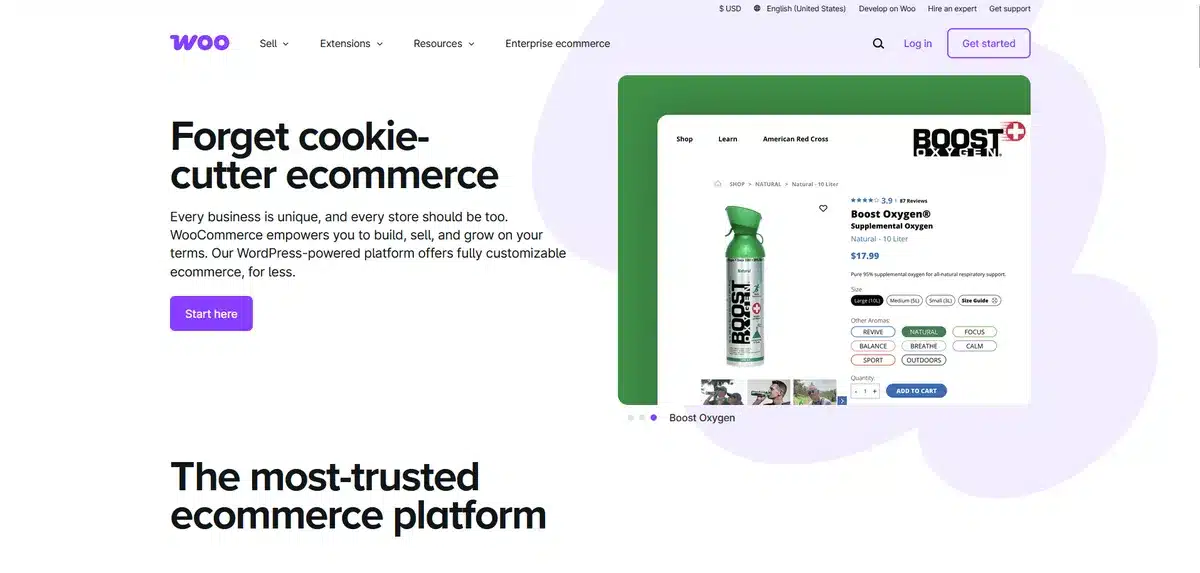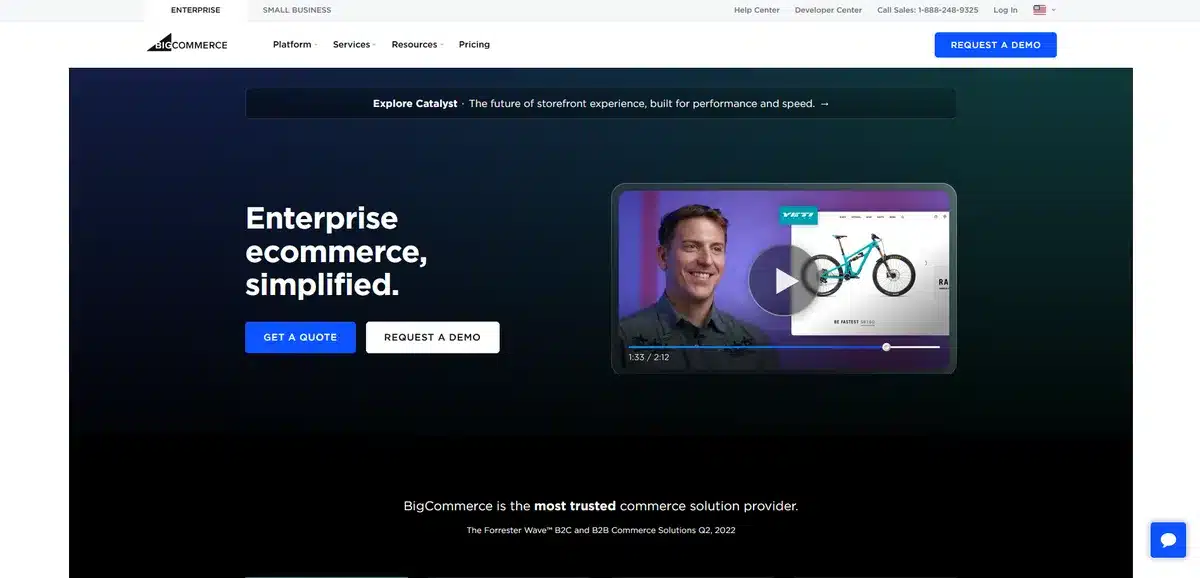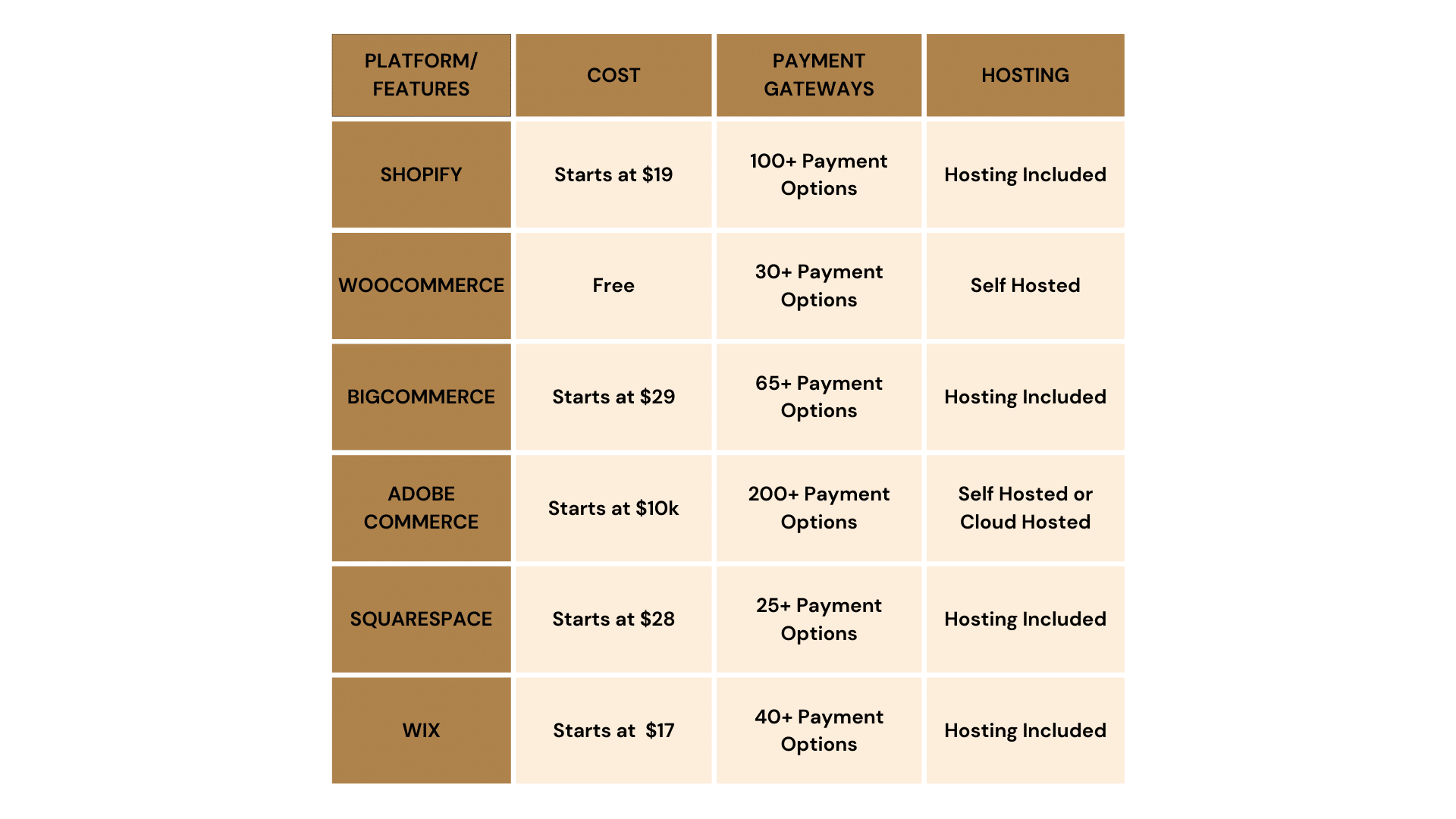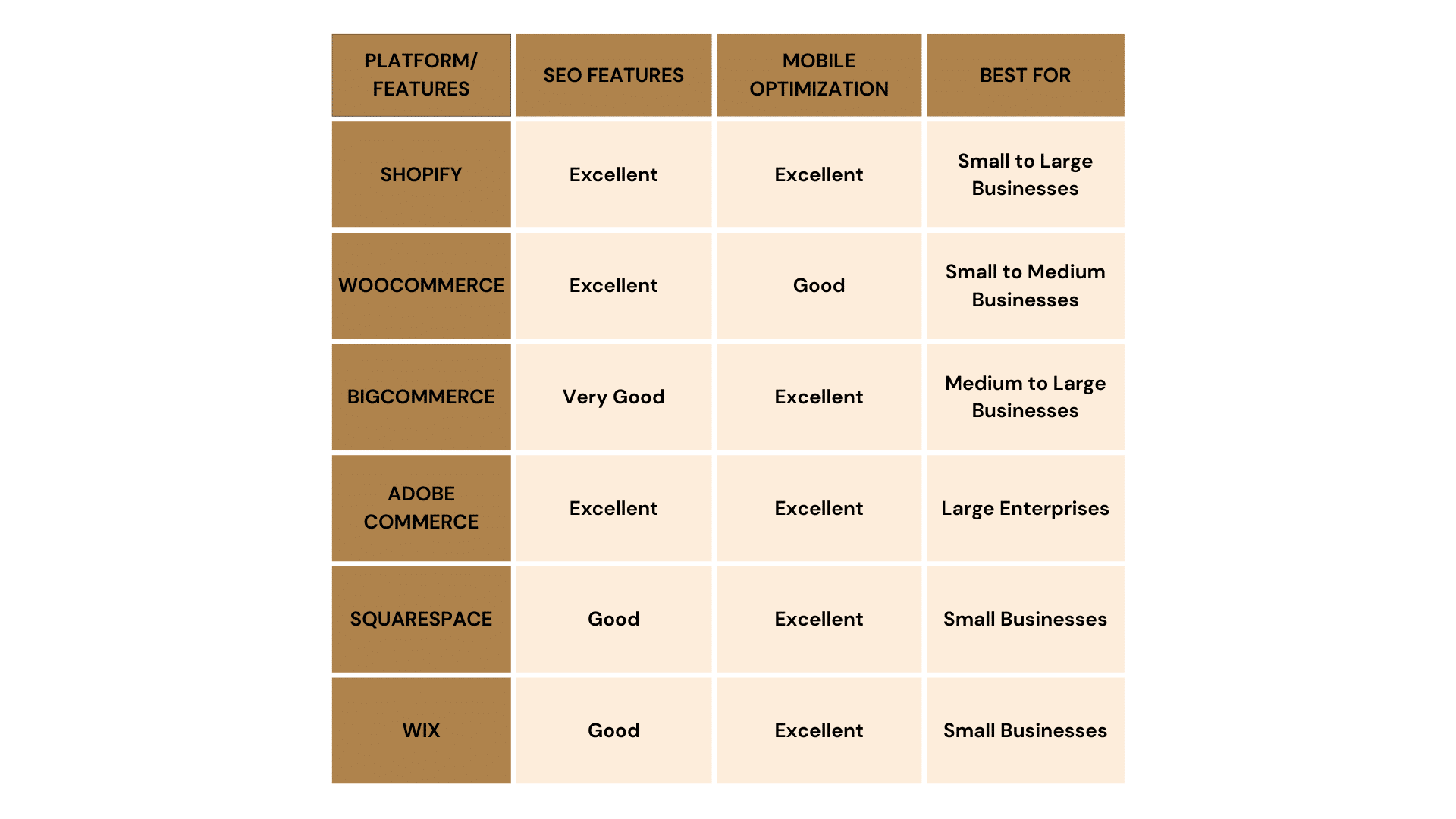What’s the Best eCommerce Platform for SEO?

Having a bad eCommerce platform in 2025 is a surefire way to sabotage your SEO success in 2025.
In this article, we’ll give you the best eCommerce platform for SEO and explain what makes it our top pick.
Picking an eCommerce platform can be daunting when you see all the work you need to do to get it running.
It doesn’t help that as soon as you search for the best eCommerce platform for SEO, you get hundreds of different options to choose from. With how important SEO is for website optimization, it’s vital to pick the right eCommerce platform.
Don’t worry, we did all the heavy lifting for you. We’ve researched and tested over 15 eCommerce platforms to find out which platform is the best.
Below you’ll find the best eCommerce platform for SEO, as well as some honorable mentions in case you want solid alternatives.
In need of an eCommerce store for your business? Let us help.
How We Picked Our Best eCommerce Platform for SEO in 2025
Before we talk about the best eCommerce platform for SEO that we tested, we would like to go over what things we chose to compare them with.
-
Features: Does it come with intuitive tools and powerful plugins? Is it highly customizable? Anything that lets them stand out from the competition goes here. Most eCommerce platforms share features, so we wanted to highlight who did it best and why.
-
Pricing: Does it offer several plans? Do they charge you a percentage fee per sale? Anything related to monthly costs to maintain your eCommerce website will go in here. Even those sneaky fees that you might not notice until it’s too late.
-
Pros: What do they do better than the alternatives? Is there anything that they do that other eCommerce platforms don’t do?
-
Cons: Are the fees per sale eye-watering? Do they offer zero support if something breaks? All the negatives go here.
With that out of the way, let’s first talk about about some honorable mentions that we think deserve some attention, too.
While we didn’t think they compared with our pick for the best eCommerce platform for SEO, they are still solid in their own ways.
The Best eCommerce Platform for SEO: Our Top Picks
All of these eCommerce platforms are here because they provide a good package for most businesses out there.
All of them are fantastic and are very close to our favorite platform this year.
Let’s give them a quick rundown of what features they have, their pricing, their pros, as well as their cons.
1. WooCommerce

If you’ve been around the eCommerce space for a while, you’ve certainly heard of WooCommerce. This eCommerce platform is a great option if you want the best WordPress eCommerce integration out there. While it’s not as in-depth as other options, it still has some great features.
Features:
-
Fantastic tech support: It’s a consistently evolving plugin with a strong tech support team to help you if it crashes or if you find any issues. While quick tech support has become the norm nowadays, WooCommerce’s tech support goes above and beyond to help you solve your issue.
-
Easy integration with other plugins: Being a plugin for WordPress means it has a lot of other great plugins to work with. Do you want to use Yoast SEO to make sure your SEO strategies are helping you grow? You can!
-
Custom URLs: Having the freedom to create custom URLs for your product pages is fantastic for search engine optimization. Since they’re custom it means you can add your main keywords and optimize for SEO to your heart’s content.
-
Highly customizable: It’s easy to add and change your product listings with WooCommerce.
-
SEO ready: Dozens of different SEO tools to choose from and use as soon as you add it to your website.
Pricing: Being an open source plugin means that it’s free to the public. This means all you’d have to pay is for the website hosting and your WordPress page.
Pros
-
Thousands of integrations with different plugins for WordPress.
-
Mobile friendly.
-
Completely open source, so it’s free forever.
Cons
-
There is a learning curve involved in learning how to use the plugin.
-
It lacks automation in several areas that need constant updating.
-
You can only use it on WordPress, so if your website is built on another CMS builder, then you’re out of luck.
-
It’s not an all-in-one suite. You need to find extra plugins that help you solve other eCommerce issues you might have.
WooCommerce is a strong eCommerce platform. It lets WordPress users sell products easily. Plus, it doesn’t require them to overhaul their website.
2. BigCommerce

One of the leading eCommerce platforms is, without a doubt, BigCommerce. Their main selling point? The ability to create and manage an eCommerce website without needing any sort of coding knowledge.
This is a big advantage over other eCommerce platforms like WooCommerce that do require you to have some basic coding knowledge. This does come at the cost of less customization, though.
Features:
-
Customer-friendly: BigCommerce offers a myriad of options that make the customer experience a lot better compared to alternatives. Offering more than forty payment methods at checkout simplifies the buying process for customers.
-
Mobile-friendly design: BigCommerce lets you optimize your product pages for mobile users. This ensures that anyone can shop on your website no matter where they are.
-
Custom URLs: Like WooCommerce, being able to create custom URLs for your product pages helps immensely for your organic search.
-
Fast-loading pages: Having fast-loading product pages that keep the quality of high-resolution images is a must for any business in 2025.
Pricing: Plans start at $29 per month for the standard version and quickly go up to $300 per month for the pro version.
It can be deceptively expensive depending on how successful your brand is, though. With their pro package, you can only get up to $400,000 per year in sales. After that, for every $200,000 in sales, you’ll have to pay an extra $150 every month.
If you don’t want to spend that extra money, you can ask to be changed to the Enterprise option. Of course, the Enterprise option is more expensive and tailored to your company.
We’re not the biggest fans of an eCommerce platform taking more money out of your brand only because it is doing well.
Pros
-
SEO-ready from the start.
-
Fully hosted.
-
Solid customer support.
-
Easier to scale compared to alternatives.
Cons
-
Themes can be a bit expensive.
-
Slow loading pages if you are not optimizing at all.
-
Can get VERY expensive if your company is doing well.
Overall, BigCommerce is a solid eCommerce platform that has a lot of solid features for you to use. Its biggest downside being its pricing system.
3. Adobe Commerce (formerly known as Magento)

Adobe Commerce is a great eCommerce platform for large businesses looking for a non-hosted place to add their product listings.
If you’re looking for an eCommerce platform with near-endless customization, then Adobe Commerce might be a solid alternative to our best eCommerce platform for SEO.
Unlike the other honorable mentions so far, if you want to build and add your product listing with Adobe Commerce, you will need professional help.
This eCommerce platform requires good coding knowledge to do anything. It’s great for developers since it means they can customize to their heart’s content. But for people with zero coding experience, it might be a hindrance if they don’t have the budget to pay a web developer.
All this being said, Adobe Commerce has some great features that justify it having a steep learning curve.
Features:
-
Customizability: With Adobe Commerce, you can create stunning product pages that are unique to your website.
-
SEO friendly: Since you can customize nearly anything on this eCommerce platform, you can tweak and optimize your product pages and listings to meet modern SEO practices.
Pricing: Adobe Commerce is made for big companies trying to migrate to a fully customizable eCommerce platform. This is why the pricing for plans is tailored to your company.
That being said, the prices tend to range between $10,000 and $60,000 per year, which is a big ask for most companies out there.
Pros
-
Advanced SEO settings for seasoned professionals.
-
Near-limitless customizability for every aspect of your pages.
-
Integration with Amazon sales channels.
Cons
-
Extremely expensive.
-
Requires good coding knowledge.
While Adobe Commerce offers amazing features for big businesses, we don’t think the astronomical price is justifiable for 99% of companies out there. That being said, if you manage a big company with hundreds of products and want customizability, then it’s a solid pick.
4. Squarespace

If you’ve been around the eCommerce space for a while, then you’ve probably heard of Squarespace. Regarded as one of the easiest CMS builders and eCommerce platforms to use, Squarespace has some nice features you should know about.
Features:
-
Mobile-responsive: With so many customers buying from their mobile devices, it’s mandatory to have a website that is fully optimized for mobile devices. Squarespace provides you with a mobile-responsive eCommerce platform from the start.
-
Amazing community: You’ll be able to ask questions and get support from hundreds of business owners and web developers using Squarespace.
-
Ready to blog: Considering how important link building and interlinking is for SEO, having a built-in blog is great.
Pricing: Squarespace offers different eCommerce plans ranging from $28 per month for the basic commerce plan to $52 per month for an advanced plan.
Pros
-
Easy to use.
-
Hundreds of templates to choose from. All stunning and ready to go.
-
Great SEO features that can be used from the start. No plugins or extra steps needed.
Cons
-
Templates don’t offer as many customization options as other eCommerce platforms.
-
Severe lack of scalability. If your company offers hundreds of products, then other eCommerce platforms are better.
In general, Squarespace is a good option for small businesses with a small product list looking for an eCommerce platform that is easy to use and manage.
Does your website need more organic traffic? We can help.
5. Wix

Wix, like Squarespace, is an easy-to-use eCommerce platform for business owners that want a drag-and-drop website builder with hundreds of templates to choose from.
While it has some similarities with Squarespace, it differentiates itself by simplifying steps in SEO to make it as beginner-friendly as possible.
Wix offers some interesting features, such as:
-
Easy product updates: Wix makes it easy to change and adjust your website and products. No code knowledge is needed.
-
SEO for beginners: Wix makes it simple to use SEO at a basic level, meaning that even if you have very little information about digital marketing or organic search, you can optimize your website.
-
Mobile-first approach: Like our other alternatives, Wix understands the importance of having a mobile-ready website. All its templates and designs are optimized for mobile devices.
Pricing: Wix offers different plans ranging from $17 per month for the light version (which we don’t recommend) up to $159 per month for its Business Elite plan.
The best option from all their plans for most companies is, without a doubt, their business plan. It offers 100 GB of space, a plethora of marketing tools, most of the eCommerce tools, and many other features.
All that for $36 per month.
Pros
-
Beginner friendly.
-
Pricing is reasonable.
-
The interface is completely drag-and-drop.
Cons
-
Beginner-friendly SEO features mean that you are missing out on key SEO optimization features other eCommerce platforms have.
-
Similar to Squarespace, templates are not customizable enough. This means you are bound to see a company with the same template you used, but with different colors.
We value Wix slightly above Squarespace due to it being even easier to use than Squarespace, despite it having more features.
6. Shopify
Shopify is hands down the best eCommerce platform for SEO. They power more than 5 million eCommerce websites all over the world. This makes it the most popular eCommerce platform out there right now.

Shopify offers all the features you need for your eCommerce website while giving you the flexibility to make it as easy or complex to use with plugins.
If you’re new and want to build your first eCommerce website, then we cannot recommend Shopify more.
Shopify has a lot of good features that add to the list of amazing features the honorable mentions have.
Features:
-
Hundreds of curated plugins: Shopify’s plugin marketplace has dozens of SEO-related plugins for you to choose from.
-
Strong blogging page: You can immediately start creating articles for your company with its integrated blog.
-
In-depth analytics: On-site analytics help you keep track of your KPIs. While not as in-depth as a standalone tool, it still provides you with most of the metrics you care about.
-
User-friendly: Despite having a lot of tools and plugins to work with, Shopify, in its base form, is simple to understand and get used to.
-
Amazing customer support: If your Shopify account ever crashes or has a weird error, you can send a ticket to their customer support and they’ll help you solve your issue.
-
Dedicated community: Most of the plugins you’ll be using from the marketplace are created by different developers and updated regularly. Shopify only curates and ensures that every plugin is of high quality.
Pricing: Shopify has several plans ranging from $19 a month for the basic plan up to $2,300 per month for big companies that need all the features that Shopify offers.
We recommend the $49 per month plan as the starting point since it lets you add more staff accounts to your website. This makes it easier to manage among several people instead of having to share one account.
Pros
-
Dozens of SEO plugins fit different needs.
-
Direct integration with Google Analytics.
-
Every Shopify plan has a native payment provider that lets customers pay with all major payment methods in the world.
-
A built-in AI assistant that helps you manage your stock and helps you write product descriptions.
Cons
-
No way to change URLs. This is bad for organic search, but not a complete deal-breaker.
-
No way to edit robots.txt files. This means Google’s search engine won’t know which pages it should crawl in the first place.
Shopify is the best eCommerce platform for SEO in 2025 for most companies.
Unless the other eCommerce platform alternatives have a feature that you need for your business, just go with Shopify.
The Best eCommerce Platform for SEO is…
There is no denying it, Shopify provides brands with all the tools and features they need from an eCommerce platform.
Not only that, it offers the best selection of curated plugins for you to choose from. These plugins can improve any area of your store in little to no time.
Shopify is easy to use and has the same if not more customizability compared to the alternatives. All of this while not being as expensive as other options like Adobe Commerce.
If we had to give an overall pick to any brand out there looking to start their eCommerce business right, we’d pick Shopify 9/10 times.
eCommerce Platform Comparison Table
We added these two tables to make it easier for you to compare between each platform:


Get a Custom-Built Shopify Website With Blacksmith.
We went through some of the best eCommerce platforms for SEO and gave you reasons why you should and shouldn’t pick them. That being said, if you want the best of the best, you’ll want a custom Shopify store for your business.
With our Shopify development service, we can create the perfect Shopify website for your business. You don’t have to sacrifice features anymore; get all the best SEO features available without having to do any work yourself.
We will build your first Shopify store or update it to follow all the best SEO and marketing strategies of 2025.
Still unsure if you need a Shopify store for your business? Get on a call with us and let us explain why you need it to thrive in 2025.
